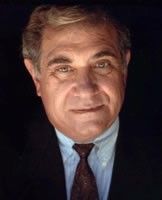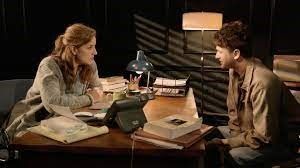Lawrence Harbison, our very own critic, ordinarily brings you up to date with what’s hot and what’s not in New York; but since the New York theatre is closed down for the foreseeable future, in this column Larry reports on shows you can stream on your computer or other preferred gizmo.
NJ Rep is currently streaming Sitting and Talking by Lia Romeo, featuring Dan Lauria and Wendie Malick. It’s a lonely hearts play about a man and a woman who connect via a dating website, but they can’t do the usual – meet for a drink or coffee – because of the pandemic, so they meet for “dates” on Zoom over a period of several weeks. He’s a divorced man in his late 60s; she’s a widow. At first, she is reticent; but gradually, she warms to him. At one point, they even have Zoom sex (well they try, anyway). In the end, she’s in her Zoom space laying in a hospital bed. Does she have the virus? Is she sleeping? Dead? In his apartment, he reads a Robert Frost poem to her, the one about good fences making good neighbors; but then, she appears behind him, full of love, and they have become a couple. Is this real, or is it his fantasy?


This is a poignant love story, given the way it has to play out. Perfect for Zoom. Lauria and Malick, longtime friends, are wonderful. But that ending. Huh?
Stream it at: www.njrep.org/plays/sittingtalking [This show streamed through April 18th, 2021, and is no longer available.]
TheatreWorks Hartford is streaming their production of Adam Rapp’s The Sound Inside, which played on Broadway just before the pandemic shut us down, featuring a titanic performance by Mary Louise Parker as a 53-year old Yale creative writing professor dying of cancer having to deal with a problematic but brilliant student, with whom she becomes increasingly obsessed. Much of the play involves direct address story-telling to the audience, a device which ordinarily I do not favor, but given that the play is in many ways about the nature of fiction, this device works pretty well. In the end, it’s all about death. Maggie Bofill is riveting as the dying professor, as is Ephraim Birney as her student.

Have you ever had the experience of reading a great novel and then being depressed when you have finished it because you don’t have it to read anymore? That’s the way I felt when I finished Hermione May’s monumental Tom Stoppard. A Life (Alfred A. Knopf, 2020). May takes us from Stoppard’s early childhood in Czechoslovakia, to India, where he and his mother lived before emigrating to England, where his family name was changed from Straussler to Stoppard and Tomas became Tom. Stoppard started out as a journalist in Brighton, began writing short stories and radio plays and then, inspired by what he saw at the theatre, started writing plays, his breakthrough being Rosencrantz and Guildenstern are Dead, which premiered at the Edinburgh Fringe Festival where, miraculously, it was seen by a London theatre critic who gave it a rave review. The National Theatre asked for the script and the rest is history. I was fascinated to read about the genesis of each subsequent play and the enormous research he did. Stoppard is an inveterate re-writer, often making changes to the text during the first run of a play, always doing this with subsequent revivals. What a treasure trove of Ph.D. dissertation material!
We learn of his close friendships with fellow playwrights such as Harold Pinter and David Hare, which were often adversarial as Pinter and Hare are left-wingers and Stoppard is sort of a middle of the road conservative in that he doesn’t embrace every political cause that comes down the road, except for his support of his friend Vaclav Havel’s revolution in Czechoslovakia and the persecuted Belarus Free Theatre which led to the creation of his only “political play,” Rock and Roll.
We also learn of the many women in his life, from his troubled first wife to a woman he was married to for many years, until he wasn’t, to lengthy affairs with actresses Felicity Kendall and Sinéad Cusack until finally he appears to have found contentment with Sabrina Guinness. Above all, Stoppard comes across as a kind and generous soul, someone you wish you could share a pint or two. Amazingly, he smokes like a chimney, has the same shaggy head of hair he had when he burst on the scene in the late 1960s albeit gray now – and is 84 years old. Go figure. What will probably turn out to be his last play, Leopoldstadt, about Viennese Jews in the years up to the rise Hitler closed because of the pandemic. My guess is it won’t be done over here due to its very large cast so I’ve ordered a copy. Can’t wait to read it!
After finishing the book, I went back and read his plays, which I had seen in New York, with new appreciation of his genius.
Lee’s book is a must-read. It’s one of the greatest biographies of a literary or theatrical figure I have ever read.
It’s amazing what you can find on YouTube. Recently, I watched the original productions of Pinter’s The Caretaker (with Robert Shaw and Alan Bates – both great – and Donald Pleasance – astounding) and No Man’s Land. I can’t recall if I ever saw a production of The Caretaker but I did see the original production of No Man’s Land, at the Longacre Theatre, featuring Ralph Richardson as Hirst and John Gielgud as Spooner, and watching them on YouTube brought my astonished memory of that memorable evening in the theatre all back to me. I was young then, and much of Pinter’s play passed over my head. Now that I am a geezer, I am better able to appreciate the play itself, while still enjoying the great actors.
"It requires a certain largeness of spirit to give generous appreciation to large achievements. A society with a crabbed spirit and a cynical urge to discount and devalue will find that one day, when it needs to draw upon the reservoirs of excellence, the reservoirs have run dry."
— George F. Will
“It is not the critic who counts; not the man who points out how the strong man stumbles, or where the doer of deeds could have done them better. The credit belongs to the man who is actually in the arena, whose face is marred by dust and sweat and blood; who strives valiantly; who errs, and comes short again and again, because there is no effort without error and shortcoming; but who actually does strive to do the deeds; who knows the great enthusiasms, the great devotions; who spends himself in a worthy cause; who at the best knows in the end the triumph of high achievement; and who at the worst, if he fails, at least fails while daring greatly, so that his place shall never be with those cold and timid souls who know neither victory nor defeat.”
— Theodore Roosevelt